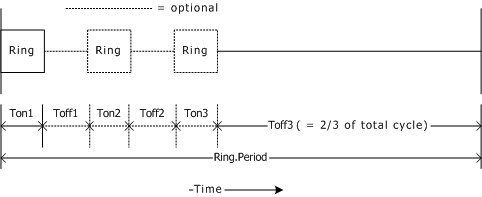
For CX 2000 boards, you can specify up to three different ring patterns (cadences) to use at different times. For example, you can configure one cadence to signify an extension-to-extension call, another cadence to signify an outside call, and another cadence to signify a callback.
Each cadence can have up to three rings per cycle. For example, your first cadence could consist of one 2000 ms ring followed by 4000 ms of silence (like a typical ring tone in the United States). Your second cadence could sound more like the ring tone in the UK (ring ring...ring ring...). Your third cadence could have three rings (ring ring ring...ring ring ring...).
Ring cadencing is controlled with board keywords. Cadencing keywords have default values that specify three distinctive ring cadences. The following keywords determine each cadence:
|
Keyword |
Description |
|---|---|
|
Determines the length (in ms) of the first ring in the cadence. | |
|
Determines the length (in ms) of the silence between the first and second rings in the cadence. | |
|
Determines the length (in ms) of the second ring in the cadence. | |
|
Determines the length (in ms) of the silence between the second and last rings in the cadence. | |
|
Determines the length (in ms) of the last ring in the cadence. | |
|
Determines the length (in ms) of the silence between the last ring in the cadence and the first ring of the next cadence. This value must be equal to 2/3 of the total length of the cadence. | |
|
Must be set to the total length of the cadence (in ms). |
The following illustration shows the role of each keyword in determining a cadence:

You can omit the third ring, or both the second and third rings, by setting their keywords to 0. However, Ring.Cadences[x].Ton1 and Ring.Cadences[x].Toff3 must always be set. Also, Ring.Cadences[x].Toff3 must always equal at least 2/3 of the total length of the cadence. This is so the ring phasing algorithm works correctly.
All cadences must be of the same length. For example, the total length of the following cadences must be the same for each cadence. Set the Ring.Period keyword to this length.
Ring.Cadences[x].Ton1
+ Ring.Cadences[x].Toff1
+ Ring.Cadences[x].Ton2
+ Ring.Cadences[x].Toff2
+ Ring.Cadences[x].Ton3
+ Ring.Cadences[x].Toff3
Cadencing keywords have default values that specify three distinctive ring cadences. The following table lists the default values for the keywords:
|
x |
Ton1 |
Toff1 |
Ton2 |
Toff2 |
Ton3 |
Toff3 |
Total ms |
Ring pattern |
|---|---|---|---|---|---|---|---|---|
|
0 |
2000 |
0 |
0 |
0 |
0 |
4000 |
6000 |
ring...(silence)... |
|
1 |
600 |
800 |
600 |
0 |
0 |
4000 |
6000 |
ring...ring...(silence)... |
|
2 |
400 |
400 |
400 |
400 |
400 |
4000 |
6000 |
ring...ring...ring...(silence)... |
The following illustrations show the three default cadences.


